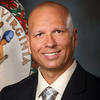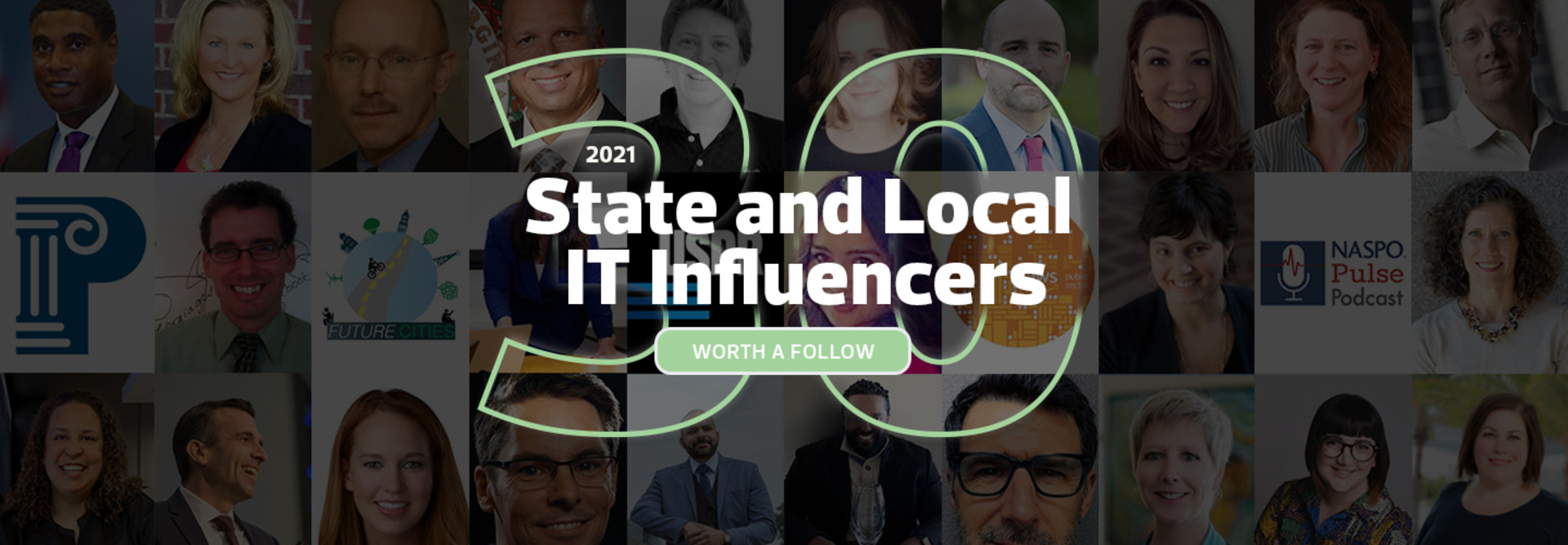30 State and Local Government IT Influencers Worth a Follow in 2021
The past year has been a tumultuous one for state and local governments, as they have had to contend with the continued effects of the coronavirus pandemic, rising ransomware attacks and citizens’ growing desire for government services to be more digital and responsive.
The landscape is daunting, and state and local leaders will confront a multitude of challenges in the year ahead. How can they expand broadband access for citizens and narrow the digital divide? How will agencies protect residents from cyberattacks that are increasingly affecting vital services? How will government agencies use federal funding to invest in and modernize aging IT infrastructure?
Those are a lot of hefty of questions, and there are many more facing elected officials, IT leaders and those who work in public service. Thankfully, there are leading voices to turn to for insight into where government IT trends are heading.
StateTech presents our annual list of bloggers, Twitter personalities, podcasts and those who use their social channels to influence the conversation.
We hope these 30 state and local IT influencers, listed in alphabetical order by first name or organization name, will be your guiding stars for insights and opinions on the latest in government technology. If you’re on the list, spread the news and grab our IT influencer cover image for your social media pages or websites.

In November 2020, Crawford was named Texas CIO, and has served as the executive director of the state’s Department of Information Resources and in Texas state government for two decades. Crawford, who succeeded CIO Todd Kimbriel, regularly uses her Twitter and LinkedIn platforms to highlight the work of the DIR and show how cybersecurity and workforce issues affect all state governments.

Riddick, a retired U.S. Army colonel, served as CIO of the U.S. Virgin Islands from 2016 to 2019 before becoming CIO for New York State in December 2020. Although he is not very active on social media, Riddick stands out for his comments on the experience of being a Black state CIO alongside fellow Black IT leaders.

Formerly the IT director and CIO for the Iowa Department of Transportation, Dunn was named the state’s CIO in the summer of 2019. Though she has a light presence on twitter, Dunn is incredibly active on LinkedIn, often posting about the future of work, the need to expand broadband and how the role of CIOs is changing. Dunn has emerged as an advocate for the flexibility remote work provides state government IT workers and the necessity of broadband expansion in rural states like Iowa.

Alongside other hyperscale cloud providers, Amazon Web Services is a pillar supporting government work in the cloud. The company’s public sector blog is teeming with timely articles that offer insights and best practices to state and local government IT leaders and rank-and-file workers alike. That includes everything from how to make transportation systems more resilient via the cloud to how the cloud can help accelerate COVID-19 vaccine distribution.

Schrier, formerly the longtime CTO of Seattle and CIO of the Seattle Police Department, has been a senior adviser at FirstNet, the interoperable public safety broadband network, since 2016. Schrier is very active on Twitter and regularly sounds off on issues related to public safety and technology, including artificial intelligence, hybrid work tools and the evolution of emergency operations centers.

Rivero became the chief data officer for Virginia in 2018, and prior to that served as the chief data officer and chief enterprise architect for the U.S. Department of Transportation’s Federal Transit Administration. Rivero maintains a robust LinkedIn presence and regularly posts about how the commonwealth is evolving its data governance strategies and technologies and how open data portals are being used to help residents.

Bishop has been serving as chief digital services officer for the city and county of San Francisco since 2017. She told StateTech earlier this year that the city and county are operating in the cloud to drive innovation. She maintains an active and frank Twitter presence in which she discusses opportunities for digital transformation and the challenges of modernizing government services.

Yates has been the smart city director of Philadelphia since 2019 and is leading the charge to make city services more intelligent and more equitable. Yates primarily uses LinkedIn to highlight smart city initiatives in Philadelphia and innovative government technology projects in other cities and states.

Future Cities is a monthly podcast from the Arizona State University UREx Sustainability Research Network. The podcast aims to increase awareness of and spur action on urban resilience. Recent episodes have focused on topics such as green infrastructure and the design and operate infrastructure systems.

In June, Sankey was named the permanent CIO of Atlanta, after serving as CIO for the Ohio Department of Job and Family Services. There, Sankey led efforts to improve eligibility and enrollment processes and deployed a statewide electronic document management system alongside a rollout of Microsoft Surface Pro devices. Although he has a minimal social media presence, Sankey is definitely a rising star.

Correllus has been deputy CIO and chief data officer of North Carolina since 2016 and leads the state’s Government Data Analytics Center. Earlier this year, StateScoop honored him as a State Executive of the Year, noting that the GDAC “originally focused on criminal justice and law enforcement support with small fraud and compliance programs,” but that it “now includes educational, workforce, healthcare, and exponentially larger criminal justice and fraud footprints.”

Bonaguro became the chief data officer of California in February 2020 after previously serving in that role for the city and county of San Francisco and as head of systems and data for cybersecurity startup Corelight. In October 2020, she unveiled a statewide data strategy to connect the state’s various data collection efforts — and to see what is and isn’t working. Bonaguro maintains an active, informative and casual Twitter presence, posting regularly about data governance and ways to make government more innovative.

Rogers is not your typical pro; she serves as the enterprise geographic information system and data visualization coordinator for Wyoming and is focused on leveraging GIS data to improve government services and citizens’ experience of government. Rogers is passionate about using data to drive innovation in government and posts regularly on Twitter and LinkedIn on the topic.

In June, after serving for 10 years as deputy CIO of Ohio, Flory was named to the top spot, succeeding Ervan Rodgers. Flory has been a key player in the development of the state’s InnovateOhio Platform and is now in charge of continuing efforts to create a unified digital experience for citizens across state government. The goal is that residents won’t have to go to a government office to do business with the state of Ohio.

Taylor has flitted back and forth between jobs in the private sector and in government, which is the perfect background for his role as director of the Colorado Digital Service. Like the U.S. Digital Service, CDS seeks to recruit private sector engineers, designers, product managers and procurement specialists to serve the state for short “tours of service.” Taylor is passionate about this mission and uses his platforms on twitter and LinkedIn to show how technology can improve government and how government can improve the lives of citizens.

Until July, Jones had served for four years as CIO of the IndianaDepartment Of Child Services, where he introduced virtual reality simulations to show applicants what it’s like to be a case worker for the department, an initiative that helped reduce case worker turnover by about 18 percent. Now he is the COO of Cardinality, a startup that uses cloud-based AI software to help government health and human services agencies improve outcomes. Jones is active on LinkedIn and often discusses new ways to enhance innovation in government service delivery.

Parker has been CTO of the District of Columbia since February 2019, and in the past year and a half has forged close relationships across D.C. government to combat COVID-19. A firm believer that IT leaders enable the business of government, Parker uses her Twitter platform to regularly promote government technology programs and government initiatives in general.

Garcia sits at the heart of where Silicon Valley and government intersect as the head of digital strategy and engagement for San Francisco. On Twitter and LinkedIn, Garcia often extolls the idea that “innovation” in government is not the province of a chosen few and should be fostered across teams.

A longtime senior fellow at the Brookings Institution and policy director of the Metropolitan Policy Program there, Muro regularly posts on Twitter about the evolution of metropolitan areas. He is a great source of knowledge about innovation in cities and government and has argued on Twitter for a more inclusive view of innovation.

Ward, the director of policy and research at the National Association of State Chief Information Officers, sits at the nexus of technology and policy trends and how they affect state government. She often uses her social media presence to promote NASCIO research and news on key IT trends.

Public libraries are a sometimes overlooked element of public life, but they became vital centers of education and hubs of connectivity during the pandemic. Jeske, the city librarian for the Denver Public Library, often uses LinkedIn to highlight how public libraries are evolving to serve the changing needs of the communities they serve.

Procurement can be a rather dry topic in government IT. The NASPO Pulse podcast, hosted by Kevin Minor from the National Association of State Procurement Officials, however, manages to infuse the topic with energy and vitality, covering everything from e-procurement to cybersecurity and the evolution of procurement amid the pandemic.

The Policing Project at the New York University School of Law sees its mission as strengthening policing through democratic governance. The project’s work is focused on policing accountability on the front end and ensuring “the public has a voice in setting transparent, ethical, and effective policing policies and practices before the police or government act.” On Twitter, members of the project often discuss regulating police surveillance and the evolution of public safety.

Klau, a former Google product manager who spent 13 years at the search giant, was named in February as the California’s new chief technology innovation officer. Klau’s presence on Twitter is equal parts erudite and irreverent, and he can often be found hyping technology innovations the state is developing, including a recently unveiled digital vaccine record.

Khimji previously spent about three years as the director of technology for Reno, Nev., and early this year became the CIO for the San Francisco Police Department (she had previously served in technical roles for the Albuquerque Police Department). Khimji has an enthusiastic and effervescent presence on social media and often expounds on a wide range of issues, including remote work, cybersecurity and public safety technology.

Liccardo, the mayor of San Jose, Calif., has long been a major proponent of smart city technology as a way to multiply the reach of government employees and services. He often uses his social platforms to discuss how the city and the wider Silicon Valley region can continue to attract and drive innovation to benefit citizens.

Nichols, CTO of the Georgia Technology Authority, has been working for state government since 2002 and advises the leadership of GTA and state agencies on technology issues. Though he has a light social media presence, Nichols plays a key role in major tech initiatives in Georgia, including the evolution of the Georgia Cyber Center, a key node of cybersecurity research and training in the state and region.

Started in 2020 as a volunteer group of technologists who wanted to help state and local governments on pandemic-related technology projects as they faced a crush of demands, U.S. Digital Response has grown to be one of the largest organizations of its kind. On Twitter, the nonprofit regularly shares data on its projects and how it has helped agencies enhance innovation to meet citizens’ needs.

Whitmore is the senior vice president of Palo Alto Networks’ Unit 42 cybersecurity research unit, and previously led IBM’s X-Force threat intelligence unit. She uses her social media presence to offer insights into the latest cyberthreats governments and other organizations should be aware of.

The Smart Community Podcast is a hub that brings together a wide range of voices to discuss all things smart for cities, towns and regions. Recent episodes have focused on identity management and trust in smart communities and how Detroit is building inclusion and equity. Hosted by Australia-based engineer Zoe Eather, the podcast has had more than 240 episodes since February 2018.









